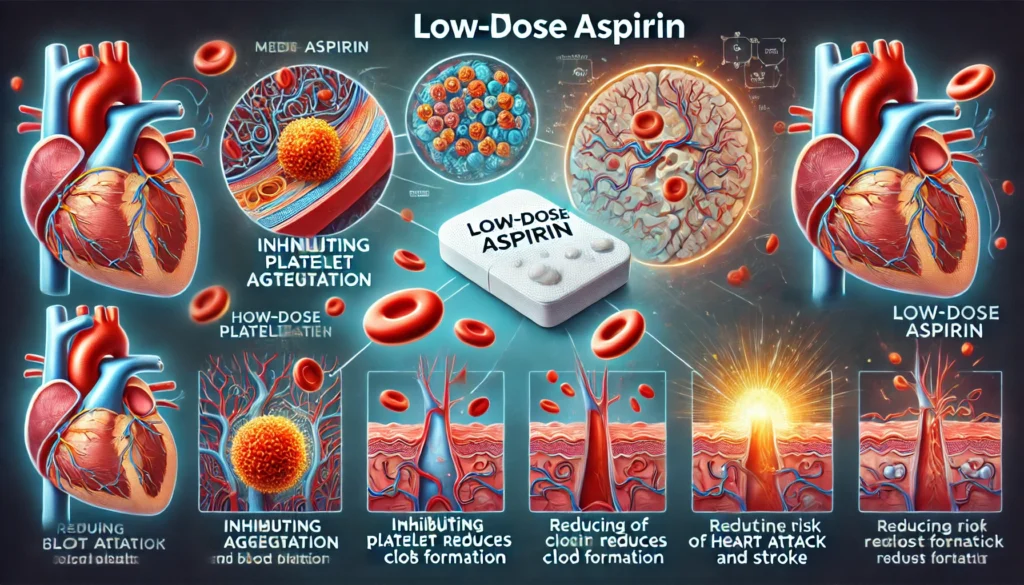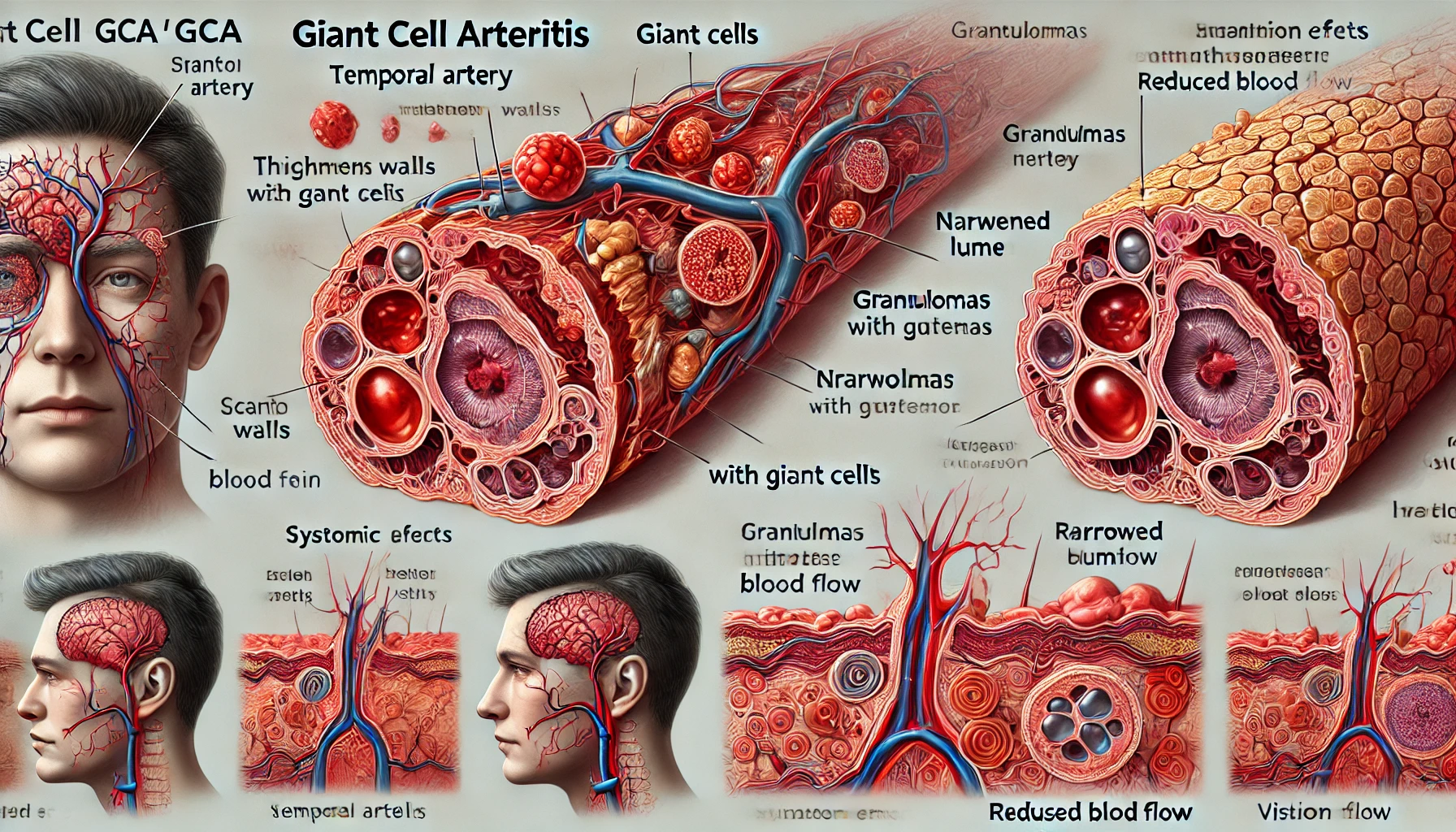Description
Giant cell arteritis (GCA) represents a systemic vasculitis mainly affecting medium- to large-sized arteries. It is often referred to as Horton’s disease or temporal arteritis. Although the alternative term “temporal arteritis” refers to swelling of the temporal arteries, it can affect arteries in other body areas, including the aorta. This inflammation is usually linked to the condition.
GCA is regarded as a medical emergency because, if untreated, it could result in loss of vision and other catastrophic problems. Women are more likely than men to get GCA, which primarily affects those over the age of 50. Inflammation of the artery walls causes the arteries afflicted by giant cell arteritis to thicken and narrow. The most serious sign of this inflammation is the potential for ischemic optic neuropathy, which can result in blindness or impaired vision.
It can also affect normal blood flow. Other typical GCA symptoms and indicators could be:
- Scalp tenderness
- Severe headache, specifically around the temples
- Jaw pain, particularly while chewing
- Fatigue
- Unexplained weight loss
- Fever
- Stiffness and soreness in the muscles, especially the shoulders and neck
- Vision changes, like double or blurry vision
- Visual disruptions such as halos surrounding lights
You May Also Like:
Hidradenitis suppurativa: Description, Causes, and Treatment Protocol
Giant cell arteritis / temporal arteritis / Horton’s disease: Description, Causes, and Treatment Protocol is an original (MedNewsPedia) article.
Possible Causes
While the exact cause of GCA remains unclear, several reasons are thought to be involved. Genetic predisposition, environmental factors, and immune system performance are the key determinants of the pathophysiology of GCA. The following variables may lead to GCA:
Immune System Dysfunction: It is believed that GCA is an autoimmune condition. Autoimmune disorders occur when the immune system wrongly attacks the body’s tissues. When GCA occurs, inflammation and damage are caused by the immune system attacking the artery walls.
Environmental Triggers: Some experts believe that infections, especially bacterial or viral ones, may be involved in starting the inflammatory response, even if the exact environmental variables causing GCA are yet unknown. In genetically predisposed individuals, exposure to particular pathogenic pathogens may stimulate the body’s immune response and lead to the onset of GCA.
Genetic Predisposition: Based on the information that is now available, genetics may have an impact on an individual’s susceptibility to GCA. Certain genes associated with inflammation and immune response have been associated with an increased risk of GCA. A family history of GCA may also raise an individual’s risk of developing the condition.

Exacerbating and Mitigating Factors
The development and treatment of GCA are significantly influenced by exacerbating and mitigating factors. These factors are listed below:
The exacerbating factors include:
Gender: GCA affects women more often than it does men, and the symptoms in women may be more severe. Uncertainty surrounds the causes of this gender disparity.
Age: People over 50 are more likely to be diagnosed with GCA, and the risk rises with age. A frequently more severe type of the disease affects older people.
Smoking: Besides raising the risk of GCA, smoking can exacerbate the disease and make it worse over time. To control an illness, giving up smoking is frequently advised.
Stress: Since stress has a detrimental effect on the immune system, it can make symptoms of GCA worse. Daily practices for decreasing stress, such as mindfulness and breathing exercises, may mitigate the negative impact of stress, depending on the disorder.
Genetics: Some people may be predisposed to GCA, or genetic factors may influence the intensity of the ailment. An increased risk has been linked to specific genetic markers and changes in genes concerned with immunity.

The mitigating factors include:
Early Identification and Treatment: Prompt detection and management are essential for minimizing the extent of GCA and lowering the possibility of consequences, including vision loss.
Abandoning Smoking: One significant mitigating element is the patient’s decision to stop smoking. It has various other health advantages in addition to decreasing the exacerbated adverse effects of smoking.
Lifestyle Changes: A balanced diet, daily exercise, and stress-reduction practices can improve general health and lessen the effects of the illness.
Corticosteroid Treatment: Prednisone is one of the high-dose corticosteroids that works well for reducing inflammation and discomfort. Effective treatment for the condition can be achieved with appropriate corticosteroid dosing management, which includes a high starting dose and a slow decrease.
Immunosuppressive Medications: Corticosteroids can be taken with other immunosuppressive medications such as tocilizumab or methotrexate to minimize side effects and reduce inflammation.
Regular Monitoring: Physicians can evaluate a patient’s reaction to treatment, make any required modifications, and identify possible issues early on with regular follow-up sessions and monitoring.
Low-Dose Aspirin: Apart from decreasing the likelihood of ischemia sequelae, low-dose aspirin could potentially alleviate certain systemic consequences of the disorder.
Patient Education: GCA can be managed more successfully by informing patients about the illness, its symptoms, the value of adhering to their treatment plan, and the necessity of scheduling frequent follow-up sessions.
Supportive Care: Support groups, therapy, and instructional materials can help patients with GCA better manage the psychological and emotional repercussions of the disease.
Bone Health: The risk of osteoporosis caused by corticosteroids may be reduced by supplementing with calcium and vitamin D.
Standard Treatment Protocol
The goals of the typical GCA treatment plan are to reduce inflammation, avoid complications, and relieve symptoms. The primary aspects of typical GCA therapy procedures are as follows:
First-Line High-Dosage Corticosteroids: For quick symptom relief and inflammation reduction, patients begin being treated on high-dose corticosteroids like prednisone. Usually, 40–60 mg is specified daily as the starting dose.
Bisphosphonates: To promote bone health and reduce the risk of osteoporosis caused by corticosteroids, doctors may prescribe bisphosphonates such as risedronate or alendronate.
Gradual Tapering: The corticosteroid dosage is progressively reduced over several months to a decreased maintenance dose after the inflammation is brought under control. Careful tapering under a doctor’s supervision is necessary to reduce adverse effects and avoid relapses.
Low-Dose Aspirin: One common treatment for ischemia problems, especially those damaging the eyes, is to administer low-dose aspirin, often 75–100 mg daily. Antiplatelet agents are made of it.
Immunosuppressive Medications: To minimize the possibility of corticosteroid-related adverse effects, other immunosuppressive medications may occasionally be used in conjunction with corticosteroids to enable a lower dose. Corticosteroids may be used with immunosuppressive medications like tocilizumab and methotrexate.
Anticoagulants: In certain situations, patients with GCA may benefit from anticoagulants such as low-molecular-weight heparin (LMWH) to lower their risk of thrombotic problems.
Monitoring: It is crucial to schedule routine follow-up visits and monitoring to evaluate the patient’s reaction to treatment, modify medication, and identify any possible problems. Image studies and blood testing are two possible forms of assessment.

Treatment Options
Apart from the customary medical interventions, a range of complementary therapies, such as prescription drugs, over-the-counter products, dietary supplements, home cures, and herbal treatments, can assist in controlling the symptoms of GCA and enhancing general health. These supplementary choices comprise:
Prescription Medications: These are as follows:
Immunosuppressive Agents
It is possible to minimize inflammation and provide a reduced corticosteroid dose by combining corticosteroids with azathioprine, methotrexate, and tocilizumab.
Anticoagulants
To lower the risk of thrombotic problems, anticoagulants may be taken into consideration in certain situations.
Bisphosphonates
These can be utilized for promoting bone health and alleviating osteoporosis brought on by corticosteroids.
Over-the-counter Formulations: Mild pains and discomfort can be better managed with over-the-counter painkillers like nonsteroidal anti-inflammatory medications (NSAIDs) or acetaminophen.
Nutritional Supplements: These involve the following:
Calcium and Vitamin D
To encourage bone health and decrease the chance of osteoporosis induced by long-term corticosteroid usage.
Omega-3 Fatty Acids
Given their reputation as anti-inflammatory agents, omega-3 supplements may help control inflammation. Confirming their effectiveness in GCA requires more investigation.
Natural Remedies: They are listed below:
Ginger
Apart from its culinary application, ginger possesses anti-inflammatory properties and can be consumed as a nutritional supplement.
Turmeric
The primary ingredient in turmeric, curcumin, has anti-inflammatory qualities and may be used as a home treatment for reducing inflammation.

Boswellia
A natural extract called Boswellia serrata has been investigated for its anti-inflammatory properties.
Lifestyle Modifications: The effects of stress on your body’s immune system and general well-being may be mitigated by practicing stress-reduction strategies including mindfulness, relaxation training, and eating a balanced diet.
Herbal Remedies: These consist of the following:
Aloe Vera
Applying aloe vera topically can help reduce the soreness on the scalp linked to GCA because of its well-known anti-inflammatory qualities.
Ginkgo Biloba
When taking supplements of ginkgo biloba, several people with GCA have noticed improvements in their circulation and intellect.
However, it is important to keep in mind that supplementary therapies should not take the place of GCA’s basic medical care. To improve overall health and symptom management, they ought to be applied in tandem with one another. Speak with a medical expert before beginning any adjunct therapy to make sure it is suitable and safe for your particular situation. To ensure appropriate disease management, always heed the advice of your healthcare practitioner and keep up with routine follow-up visits.
Conclusion
Giant cell arteritis (GCA), also known as temporal arteritis or Horton’s disease, is a systemic vasculitis primarily affecting medium- to large-sized arteries, with potentially serious complications such as vision loss. Early diagnosis and treatment are crucial to prevent irreversible damage. High-dose corticosteroids remain the cornerstone of treatment, often combined with immunosuppressive agents like methotrexate or tocilizumab to manage inflammation and reduce side effects. Supportive care, including bone health management with calcium and vitamin D supplements, regular monitoring, and lifestyle changes, plays an essential role in improving patient outcomes.
Complementary therapies such as omega-3 fatty acids, curcumin, and stress management techniques may offer additional support when used alongside standard medical treatments. However, it is imperative to consult healthcare professionals before incorporating adjunct therapies to ensure safety and effectiveness. By combining timely medical intervention, lifestyle adjustments, and ongoing monitoring, patients can effectively manage GCA, reduce complications, and maintain a better quality of life.

Additional resources for further reference
https://www.ncbi.nlm.nih.gov/books/NBK459376
https://www.frontiersin.org/articles/10.3389/fimmu.2021.623716/full
https://www.nature.com/articles/s41433-019-0608-7
https://www.intechopen.com/chapters/75468
Important Note: The information contained in this article is for general informational purposes only, and should not be construed as health or medical advice, nor is it intended to diagnose, prevent, treat, or cure any disease or health condition. Before embarking on any diet, fitness regimen, or program of nutritional supplementation, it is advisable to consult your healthcare professional in order to determine its safety and probable efficacy in terms of your individual state of health.
Regarding Nutritional Supplements Or Other Non-Prescription Health Products: If any nutritional supplements or other non-prescription health products are mentioned in the foregoing article, any claims or statements made about them have not been evaluated by the U.S. Food and Drug Administration, and such nutritional supplements or other health products are not intended to diagnose, treat, cure, or prevent any disease.


